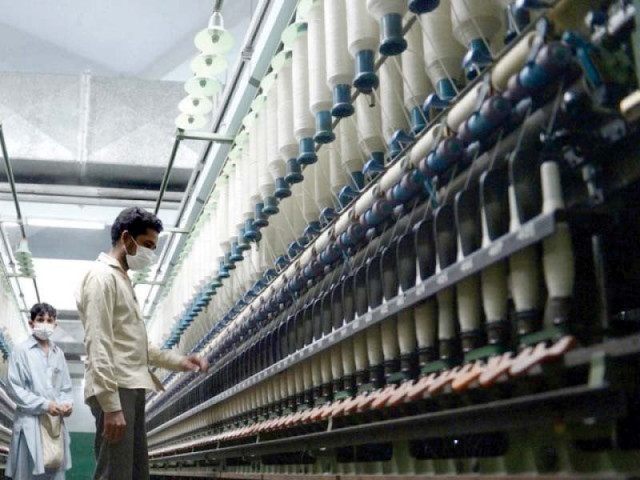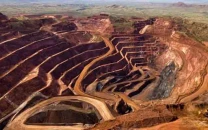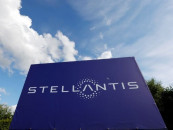5% tax on manufacturers likely
Tax on manufacturing aimed at giving relief to traders, bankers and brokers

In a move that may increase unemployment in the country, the government may impose 5% special income tax on manufacturers to create fiscal space for giving a relief of billions of rupees to the traders, bankers, brokers and real estate players.
However, Prime Minister Shehbaz Sharif on Wednesday did not vet a proposal to slap regulatory duties on 860 product lines in return for allowing their import and at the same time generate revenue to fund tax waivers for five influential sectors, government sources told The Express Tribune.
They said that the proposal was still on the table and another meeting would be held to convince the prime minister to lift the ban on imports in return for imposing duties.
Against another proposal to further increase the federal excise duty on cigarettes in the range of Rs100 to Rs300 per thousand cigarettes, the PM gave directive to further enhance the tax.
Sources said that a number of meetings had been held over the past few days in the finance ministry and a meeting was held at the PM House on Wednesday to finalise the mini-budget.
They said that the government was considering slapping 1% to 5% special income tax on those manufacturers that had annual income of Rs50 million and more but they exported less than 10% of their production.
The special income tax will replace up to 4% super tax but its applicability will begin from Rs50 million income instead of Rs150 million in the case of super tax. Sources said that certain industries would be excluded from the new tax under a negative list.
The purpose of special income tax is to raise money to compensate for the losses that the government is incurring to appease the affluent segments of society.
However, it may further discourage industrialisation in Pakistan. Manufacturing is already heavily taxed that is paying three times more than its share in the total size of economy.
“There is a proposal that 4% super tax should be replaced with up to 5% income tax on those manufacturers who do not export anything,” Finance Minister Miftah Ismail confirmed to The Express Tribune.
The government is going to hurt the industrial sector – the second major sector that creates jobs after agriculture – to compensate for the tax relief that it is planning to give to traders, bankers, stock market brokers, real estate dealers and transporters.
The total adverse revenue impact of the relief to these five sectors is around Rs75 billion.
The International Monetary Fund (IMF) discourages Pakistan from giving any tax relief but the government has assured the lender that any relief will be compensated by an equal amount of additional taxation.
The government is considering two options. First, all the five sectors should be given relief simultaneously and the impact should be neutralised by taxing other sectors. Second, the relief should be limited to traders and real estate dealers in the first phase to be enforced before August 29.
“The IMF executive board meeting for the combined seventh and eighth reviews under the Extended Fund Facility has been set for August 29,” said Esther Perez, IMF Resident Representative, on Wednesday.
Speaking at a seminar, Finance Minister Miftah Ismail on Wednesday urged every company to export 10% of its products to earn foreign exchange and assured them that the government would facilitate the exporters.
Hardly two months ago, the government had slapped a one-time 1% to 4% additional “poverty alleviation tax” on people and firms earning Rs150 million to Rs300 million a year for the sake of another Rs120 billion.
Companies falling in this bracket will either pay the poverty alleviation tax or the super tax, except those 13 sectors that are subject to 10% super tax.
Import taxes
The finance minister on Wednesday shared a plan with the PM to lift the ban on import of 860 product lines and instead impose heavy regulatory duties. But PM Shehbaz did not endorse the proposal and emphasised to keep the ban that had started paying dividends.
Last month, the Economic Coordination Committee (ECC) had approved the lifting of the ban on import of goods with the exception of fully assembled cars, mobile phones and home appliances. But the federal cabinet did not endorse the ECC’s decision.
On May 19, Pakistan had slapped a ban on import of 33 categories of goods, covering more than 860 product lines. Analysis of import data showed that there was a declining trend in imports after the imposition of the ban.
Overall imports of the banned items have shrunk by over 69%, from $400 million to $124 million, according to the commerce ministry.
The main contribution came from the auto sector and mobile phone kits whose imports were significantly reduced, covering about $218 million of the reduced import value of $400 million. The remaining 21% reduction came from 810 tariff lines.
As of August 16, the country’s imports reduced by 14% to $8.5 billion during the current fiscal year. There was nearly one-fifth reduction in the non-energy imports that dipped to $6.3 billion compared to the same period of last fiscal year.
Published in The Express Tribune, August 18th, 2022.
Like Business on Facebook, follow @TribuneBiz on Twitter to stay informed and join in the conversation.





1710175205-0/image-(9)1710175205-0-208x130.webp)













COMMENTS
Comments are moderated and generally will be posted if they are on-topic and not abusive.
For more information, please see our Comments FAQ